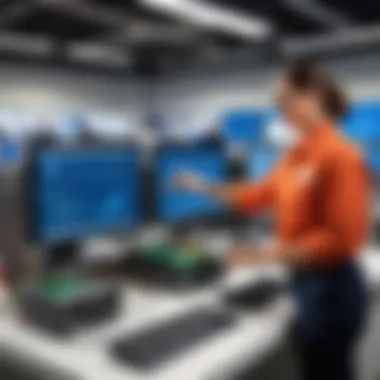Manufacturing Companies in Tucson: An In-Depth Analysis


Intro
Manufacturing companies play a vital role in Tucson's economy. They contribute significantly to job creation and economic development in the region. The manufacturing landscape here is diverse, encompassing various industries such as aerospace, electronics, machinery, and food processing. This analysis aims to identify key trends, challenges, and opportunities within this sector, providing industry professionals with relevant insights.
In exploring Tucson's manufacturing sphere, it is crucial to assess both the historical context and the current dynamics. This includes examining the workforce development initiatives and how innovation is reshaping the industry. The findings presented here will support stakeholders looking to navigate the complexities of the ever-evolving manufacturing environment in Tucson.
Prelude to Tucson's Manufacturing Sector
The manufacturing sector in Tucson plays a significant role in the regional economy. Understanding its complexities can offer insight into broader economic trends and innovations. The city's diverse manufacturing base includes key industries such as aerospace, electronics, and biomedical devices. Each of these sectors contributes uniquely to the economic landscape.
Historical Context
Tucson's manufacturing history extends back to the mid-20th century, shaped by various economic and political factors. Initially, the sector emerged from the necessity for local products and employment opportunities. The establishment of military bases in the area marked the beginning of aerospace and defense manufacturing. Over time, companies like Raytheon and Boeing have become integral to the local manufacturing environment. As technology evolved, so did manufacturing practices, leading to advancements in automation and efficiency.
Current Landscape
Today, Tucson's manufacturing sector is a blend of long-standing industries and emerging fields. The presence of major companies has attracted smaller firms, fostering a vibrant ecosystem. Recent statistics indicate that manufacturing contributes significantly to employment, representing a sizeable portion of the workforce. The industry is adapting to changes, such as a shift toward greener practices and technological innovations. Key trends include the use of robotics and artificial intelligence, which aim to enhance productivity. This landscape underlines Tucson's importance in the national manufacturing dialogue.
"Manufacturing is not merely about products; it's about creating a sustainable economy."
In summary, Tucson's manufacturing sector is characterized by its historical roots, current diversity, and potential for future growth. Understanding this sector can provide clarity on economic vitality and innovation trends.
Key Industries in Tucson
The manufacturing sector in Tucson is multifaceted, embodying a variety of industries that drive economic vitality and innovation. Understanding the key industries not only highlights their significance but also elucidates the interconnectedness of Tucson’s economy. Each industry contributes uniquely to the regional landscape, offering job opportunities, fostering technical growth, and enhancing local production capabilities.
Aerospace and Defense
The aerospace and defense industry holds a paramount position in Tucson’s manufacturing ecosystem. Companies like Raytheon and Bombardier Aerospace anchor this sector, supporting thousands of jobs and contributing significantly to the local economy. Tucson serves as a pivotal hub for research and development in aerospace technologies, attracting talent and investment.
The advantages of this industry are manifold. It not only drives innovation through advanced manufacturing techniques but also creates resilience in the local job market. The ongoing need for aircraft and defense systems ensures a steady demand for skilled labor. Moreover, collaborations with military operations in the region foster an environment ripe for technological advancement.
Electronics
The electronics industry in Tucson is characterized by both large corporations and small startups. Companies such as Intel and Jabil Circuit produce a range of products from semiconductors to consumer electronics. This industry is crucial in adapting to rapid technological changes and consumer needs.
The benefits are significant. Manufacturing in electronics generates high-value products that can be exported, thus boosting local trade. Additionally, the constant evolution in electronics ensures that the workforce remains dynamic, often necessitating continuous technical training and upskilling. This shift aids in keeping the local economy robust, centered around innovation and tech.
Food and Beverage Manufacturing
Food and beverage manufacturing represents a vital aspect of Tucson’s economy. Businesses such as Mission Foods and the Tucson-based Desert Diamond Distillery illustrate the diversity of this sector. It is not only about the production process but also highlights a cultural significance inherent in food production, linking local agriculture with manufacturing.
This industry promotes local sourcing while fulfilling consumer demand. The employment opportunities created span various skill levels, from processing to quality assurance. Furthermore, increased focus on sustainability in food production is shaping a more resilient supply chain, which benefits both the economy and the environment.
Biomedical Devices
In Tucson, the biomedical devices industry is gaining traction with companies like Celerity and Ventana Medical Systems leading the charge. This sector is pivotal due to its role in healthcare innovation and technology development. The industry focuses on creating medical devices that improve patient outcomes and its importance grows as the population ages and healthcare needs evolve.
The advantages of this industry extend beyond economic growth. There is a notable impact on healthcare quality, offering advancements that make treatment more efficient. This sector fosters research partnerships with universities and hospitals, amplifying innovation through shared knowledge and resources.
In summary, Tucson’s key industries in manufacturing not only play a crucial role in the city’s economic development but also in social advancement. They provide essential jobs, promote local businesses, and embrace technological innovation, ensuring that Tucson remains a competitive player in the manufacturing landscape.
Economic Impact of Manufacturing Companies
The economic impact of manufacturing companies in Tucson is significant and multi-faceted. This sector not only drives job creation but also influences the overall health of the region's economy. Understanding this impact provides insights into the stability and growth potential of Tucson's production landscape. As manufacturing evolves, its role remains crucial in sustaining local development and contributing to broader economic trajectories.
Contribution to Employment


Manufacturing companies are key players in Tucson's employment scene. They offer a wide range of jobs, from entry-level positions to highly specialized roles. As of 2023, approximately 15% of Tucson's workforce is engaged in manufacturing. This statistic underscores the sector's capacity to absorb skilled labor and provide competitive wages.
Key points about employment contributions include:
- Job Diversity: From production line workers to quality control specialists, the manufacturing industry in Tucson presents varied career paths.
- Stability in Employment: Manufacturing jobs are often more stable compared to other sectors, providing consistent employment even during economic downturns.
- Advancement Opportunities: Many manufacturing firms emphasize internal promotion and employee training, enabling workers to enhance their skills and advance in their careers.
This sector not only enhances the quantity of jobs available but also the quality, thereby establishing itself as a bedrock of Tucson's labor market.
Impact on Local Economy
The local economy of Tucson thrives due to the contributions of manufacturing companies. This business sector stimulates economic activity through direct and indirect effects.
The primary influences on the local economy include:
- GDP Contribution: Manufacturing plays a critical role in Tucson's GDP, contributing billions annually. This financial input is essential for city infrastructure and community services.
- Supplier Relationships: Local manufacturers often rely on nearby suppliers, fostering a network of businesses that further strengthens the economy. This interconnectedness enhances resilience against external shocks.
- Community Investments: Manufacturers frequently engage in community outreach and investment, supporting schools and local non-profits. Such initiatives promote a favorable business environment and enhance corporate social responsibility.
"Manufacturing is not just about producing goods; it is a vital part of our community's fabric and economic well-being."
Overall, the impact of manufacturing companies in Tucson stretches beyond immediate job creation. It shapes economic policies, promotes community stability, and propels future growth. Understanding these dynamics is key for stakeholders aiming to navigate the complexities of Tucson's vibrant economy.
Research and Development in Manufacturing
Research and development (R&D) plays a crucial role in the manufacturing sector, particularly in Tucson. This city's manufacturing landscape is heavily influenced by ongoing innovation. As companies seek to maintain competitiveness, R&D becomes fundamental. Through R&D, Tucson's manufacturers can optimize processes, enhance product quality, and reduce costs. Moreover, the incorporation of new technologies can lead to entirely new products and markets.
The benefits of robust R&D capabilities are manifold. Not only does it foster technical excellence, but it also encourages sustainable growth. In a competitive market, organizations that prioritize R&D are better equipped to adapt to trends and consumer needs. Emphasis on research provides a framework for long-term success, ensuring that companies are not just reacting to changes but shaping them.
Considerations surrounding R&D are also significant. Companies face challenges like funding, resource allocation, and integrating innovative practices within established operations. As they navigate these complexities, collaboration and strategic planning become essential components in maximizing R&D output.
"Investing in research and development is investing in the future of manufacturing, especially in a region like Tucson where innovation drives growth."
Role of Innovation
Innovation is at the heart of Tucson's manufacturing sector. It manifests in various forms, from the adoption of cutting-edge technologies to new management practices. Companies that harness innovation effectively tend to thrive. They not only improve existing products but also create new offerings that meet market demands. Moreover, innovative practices enhance efficiency across the board.
In Tucson, specific industries benefit immensely from innovation. For example, the aerospace and defense sectors are adopting advanced materials and manufacturing processes. This has resulted in better product performance and reduced operational costs. Overall, innovation serves as a catalyst for continuous improvement and strategic advancement in manufacturing.
Partnerships with Academic Institutions
Collaborating with academic institutions is another critical factor in Tucson’s manufacturing R&D landscape. Universities and colleges provide valuable resources and expertise that can accelerate innovation. Through partnerships, manufacturers can access cutting-edge research, technical expertise, and a skilled workforce.
These relationships foster a symbiotic environment where academic researchers can engage in practical applications of their studies. Simultaneously, manufacturers benefit from new insights and problem-solving approaches. Such collaborations ensure that the industry remains relevant and can leverage the latest advancements in technology and methodology.
Challenges Facing Tucson's Manufacturing Sector
The landscape of manufacturing in Tucson is complex and influenced by various external and internal factors. Understanding the challenges is crucial for industry stakeholders. It provides insights into what affects operational efficiency and future growth. Addressing these challenges can enhance sustainability, boost productivity, and improve overall competitiveness. This section examines key challenges including supply chain disruptions, labor shortages, and regulatory hurdles that manufacturing companies in Tucson must navigate.
Supply Chain Disruptions
Supply chain disruptions pose significant risks to manufacturers in Tucson. The global events of recent years have exposed vulnerabilities. Factors such as transportation delays, fluctuating material costs, and geopolitical tensions can impact the flow of essential supplies. For example, many Tucson companies depend on raw materials from other regions or countries. When those sources get interrupted, production schedules often lag. This situation can lead to increased costs and reduced market responsiveness.
"Supply chains are the backbone of manufacturing. Disruption in one part can cause problems throughout the entire process."
Mitigating these disruptions is critical. Companies are increasingly leaning towards local suppliers to reduce dependency on distant sources. This strategy can foster a more resilient supply chain while supporting local economies. However, it requires a balanced approach. Not all materials may be available locally. Manufacturers must analyze the trade-offs thoroughly to ensure they maintain quality and cost-effectiveness.
Labor Shortage Issues
Labor shortages represent another pressing challenge in Tucson's manufacturing sector. Many firms are finding it difficult to locate skilled workers. This shortage impacts production efficiency and innovation potential. Skilled positions often remain unfilled due to a lack of qualified candidates. Moreover, many workers in this sector are approaching retirement age, exacerbating the situation.
To counter these issues, companies are elevating their workforce development efforts. They invest in training programs that aim to equip new employees with necessary skills. Collaborating with local colleges is one strategy used to bridge the skills gap. Such partnerships can help tailor programs according to industry needs, ensuring a steady pipeline of skilled talent in the future.


Regulatory and Compliance Hurdles
Navigating regulatory and compliance hurdles is another significant challenge for manufacturing companies in Tucson. Local, state, and federal regulations govern various aspects of manufacturing, from environmental impact to workplace safety. While these regulations are essential for protecting the environment and workforce, they can also create additional burdens.
Manufacturers often face complexity in understanding and adhering to these compliance mandates. Changes in regulations can happen frequently, requiring ongoing adjustments in operational practices. Failure to comply can result in penalties or disruptions in production. Therefore, staying informed and proactive is vital.
Such a landscape necessitates a strong compliance framework within manufacturing companies. Investing in compliance management systems can streamline processes and ensure that companies remain compliant. Companies should also foster a culture of accountability among employees, emphasizing the importance of adhering to all regulations and standards.
Workforce Development and Education
Workforce development and education play a crucial role in enhancing the manufacturing sector in Tucson. As technology advances and industries evolve, the need for a skilled workforce becomes more imperative. This area focuses on preparing individuals to meet the demands of today's manufacturing jobs. Many employers in Tucson seek workers with specific skills that align with modern machinery and production techniques. Thus, comprehensive training and educational programs are vital in ensuring that the workforce is equipped with the necessary competencies.
Effective workforce development not only benefits employers but also fosters personal growth for employees. By providing access to training programs, participants can advance their careers and contribute to the economic growth of Tucson. Additionally, these programs can help reduce unemployment rates by matching workforce skills with available job opportunities. A well-educated workforce can attract new manufacturers to the area, creating a positive cycle of job creation and economic development.
Technical Training Programs
Technical training programs are essential for bridging the skills gap in Tucson's manufacturing sector. These initiatives focus on equipping individuals with practical skills relevant to specific industries. Many organizations and companies provide programs tailored to their unique needs.
For example, some might focus on advanced manufacturing technologies, such as CNC machining or 3D printing. By offering hands-on experience with the latest equipment, these programs prepare individuals for immediate job opportunities. Industry partnerships often enhance these training programs, ensuring that curricula are up-to-date with the latest advancements.
- Key benefits of technical training programs include:
- Increased employability for graduates
- Enhanced productivity for employers
- Greater innovation in manufacturing processes
These programs create a direct link between the training participants and local manufacturers. They can also lead to certifications, which hold significant value in the job market.
Collaborations with Community Colleges
Collaboration between manufacturing companies and community colleges is another vital aspect of workforce development in Tucson. These partnerships allow for aligning educational offerings with specific industry needs. Community colleges can develop programs that reflect the skills required by local manufacturers. This ensures that students learn relevant skills that make them employable right after graduation.
Community colleges often serve as a hub for technical training and workforce development initiatives. By working alongside manufacturers, they can tailor courses to address skill shortages in the region. This collaborative effort can lead to greater student retention and success.
"Partnerships between industry and education institutions create a stronger future for Tucson’s manufacturing sector."
Some community colleges in Tucson have already implemented programs focusing on specific manufacturing skills, such as robotics and quality control. Through internships and co-op programs, students gain real-world experience that enhances their understanding of the field. In turn, manufacturers benefit from a pool of ready-to-work candidates who are familiar with their operations and culture.
In summary, workforce development and education are fundamental to Tucson's manufacturing landscape. The importance of technical training programs and collaborations with community colleges cannot be overstated. By fostering a skilled workforce, Tucson can enhance its manufacturing capabilities and promote economic growth.
Sustainability in Manufacturing
Sustainability has become a critical aspect of modern manufacturing. In Tucson's manufacturing sector, adopting sustainable practices is not just a trend but a necessity. Companies must consider environmental impacts, resource conservation, and long-term viability. This shift not only helps in reducing operational costs but also enhances the brand reputation among consumers who prioritize eco-friendly practices.
Manufacturers focusing on sustainability can find themselves gaining a competitive edge. They can improve efficiency in production while mitigating risks associated with regulatory compliance. As global awareness of environmental issues rises, such initiatives create opportunities for businesses to expand their market reach.
Green Manufacturing Practices
Green manufacturing practices involve integrating environmentally friendly processes into the production cycle. Tucson's manufacturing companies are increasingly adopting these methods. For example, some manufacturers are utilizing renewable energy sources like solar power. This reduces their carbon footprint significantly.
Innovations such as energy-efficient machinery also play a role. These machines consume less energy and minimize waste. Additionally, companies are exploring biodegradable materials in packaging and production. This not only meets consumer demands but also promotes a sustainable image.
Moreover, organizations are investing in employee training regarding sustainable practices. When workers understand the importance of sustainability, they contribute to a culture focused on environmental awareness and protection.
Waste Reduction Strategies
Waste reduction strategies are essential for sustainable manufacturing. In Tucson, businesses are finding ways to reduce material waste through recycling and repurposing efforts. Companies often employ waste audits to assess the amount and type of waste produced.
Implementing lean manufacturing techniques helps minimize waste. This approach emphasizes streamlining processes and reducing excess. Furthermore, collaborations with recycling companies facilitate proper waste management.


An effective strategy for waste reduction involves engaging employees in sustainability efforts. Involving worker input helps identify areas for improvement and fosters a sense of ownership towards waste reduction goals.
"Sustainability is not just about what we make. It is about how we make it and how it impacts the world around us."
Technological Advancements Shaping the Industry
Technological advancements play a pivotal role in transforming the manufacturing landscape of Tucson. They drive efficiencies, reduce costs, and create competitive advantages for companies. In this rapidly evolving environment, embracing innovation is essential for manufacturers who wish to thrive in the industry.
Automation and Robotics
Automation and robotics are at the forefront of these technological advancements. Manufacturers in Tucson increasingly adopt automated solutions to streamline operations. These technologies enhance production speed and accuracy, minimizing human error. Moreover, automation allows for better allocation of labor, enabling workers to focus on more complex tasks that require cognitive skills.
The implementation of robotic systems is observable across various sectors, such as aerospace and electronics. For example, robotic arms excel in assembly lines, performing repetitive tasks with precision. The benefits include not only increased efficiency but also improved worker safety, as robots can operate in hazardous environments, reducing the risk of injury to employees.
"Automation is not just a trend; it is a fundamental shift in how we approach manufacturing."
Additionally, automation contributes to cost savings in the long run. While the initial investment might be high, the reduction in operational expenses often provides a favorable return on investment. As more manufacturers in Tucson integrate these technologies, they position themselves for sustainable growth.
Industry 4. Adoption
Industry 4.0 represents the fourth industrial revolution, characterized by connectivity and smart technology integration. In Tucson, this approach is increasingly becoming a reality. Companies are utilizing the Internet of Things (IoT) to create smart factories, where machines and systems can communicate in real-time.
Adopting Industry 4.0 principles leads to greater flexibility and customization in production processes. Manufacturers can respond swiftly to changing market demands and consumer preferences. With enhanced data analytics capabilities, businesses gain insights into production efficiency and areas for improvement.
Furthermore, Industry 4.0 supports a more sustainable manufacturing approach. By optimizing resource use and minimizing waste through smart technologies, manufacturers contribute positively to environmental goals. As Tucson’s manufacturing sector embraces these advancements, they not only enhance operational capabilities but also align with global sustainability standards.
Future of Manufacturing in Tucson
The future of manufacturing in Tucson is a multifaceted subject that merits close examination. It is not only about sustaining current operations but also about identifying avenues for growth, innovation, and adaptation. As industries evolve and technology advances, Tucson's manufacturing landscape stands at a crossroads, with potential opportunities and challenges that will shape its trajectory. Understanding these factors is crucial for industry professionals and stakeholders invested in this sector.
Potential Growth Areas
Tucson's economy showcases various growth areas in the manufacturing sector. Aerospace and defense, long-standing pillars of Tucson's manufacturing prowess, continue to expand. Companies like Raytheon and Boeing are investing in research and development, creating specialized jobs and driving economic growth. Their focus on cutting-edge technologies, such as advanced manufacturing processes, positions them well for the future.
Another promising area is electronic manufacturing. With the rise of the Internet of Things (IoT) and smart technologies, local companies are poised to benefit from increased demand for electronic components and systems. This sector risks outpacing others when properly leveraged with resources and skilled labor.
Additionally, biomedical device manufacturing holds significant promise. As healthcare needs grow, so does the demand for innovative medical solutions. Companies in Tucson are responding to this call, creating devices that advance patient outcomes and adhere to strict regulatory standards.
Furthermore, sustainable manufacturing practices present a unique growth opportunity. Companies reflecting commitment to environmental stewardship not only meet consumer expectations but also qualify for government incentives. The integration of green technologies could boost Tucson’s image as a leader in sustainable practices within the industry.
Long-term Economic Projections
Economic projections for Tucson's manufacturing sector indicate steady growth, driven by both existing industries and emerging sectors. According to local economic studies, the manufacturing sector is expected to witness an annual growth rate of about 3% over the next decade. This growth aligns with national trends, which reflect a resurgence in American manufacturing fueled by technological advancements and reshoring initiatives.
Employment opportunities are anticipated to follow this upward trend. The demand for skilled workers in sectors like aerospace and technology will likely increase. Community colleges and training centers are expected to respond to this need by enhancing technical programs related to manufacturing.
In summary, a combination of technological progress, workforce development, and the pursuit of sustainable practices will shape the future manufacturing landscape in Tucson.
End
The conclusion of this article is significant as it encapsulates the main points discussed throughout regarding Tucson’s manufacturing sector. Analyzing the manufacturing companies in Tucson reveals their profound impact on the local economy and workforce development initiatives. It is essential to recognize the variety of industries present, ranging from aerospace to electronics, which contribute to a diversified economic base in the region. By investigating these sectors, we see the interplay between innovation and traditional manufacturing practices.
Tucson stands out as a region ripe with opportunities for growth. Understanding the challenges such as regulatory compliance and labor-related issues can be beneficial for stakeholders. To navigate these concerns, collaboration among manufacturers, educational institutions, and local government agencies is vital. This cohesive approach can foster a resilient manufacturing environment.
In summary, this conclusion stresses the importance of ongoing investment in technology and workforce education, which are necessary to sustain and enhance the manufacturing landscape in Tucson.
Summary of Key Points
- Tucson’s manufacturing sector has significant economic contributions.
- Key industries include aerospace, electronics, and biomedical devices.
- Challenges such as supply chain disruptions and labor shortages are prevalent.
- Strategic partnerships with educational institutions can enhance workforce skills.
- The sector holds potential for growth, especially in technological advancements.
Final Thoughts on Tucson's Manufacturing Companies
Tucson’s manufacturing companies are at a crossroads between tradition and innovation. The landscape is evolving, driven by technology and a strong educational framework. The partnerships between industry and academia are crucial to address labor shortages and skill gaps. As these companies continue to adapt and grow, they will likely play a central role in shaping the future of the local economy.
The rich tapestry of industries in Tucson enhances its appeal as a manufacturing hub. Additionally, sustainability measures are increasingly influencing operational practices. It is this combination of potential and adaptability that makes Tucson's manufacturing sector a compelling case study for both industry enthusiasts and professionals.



